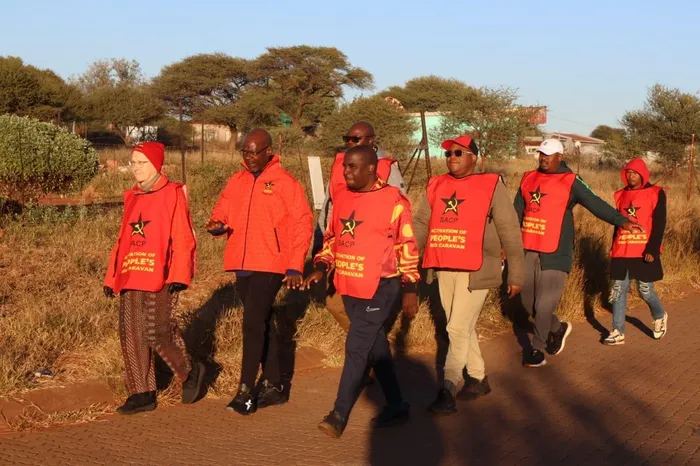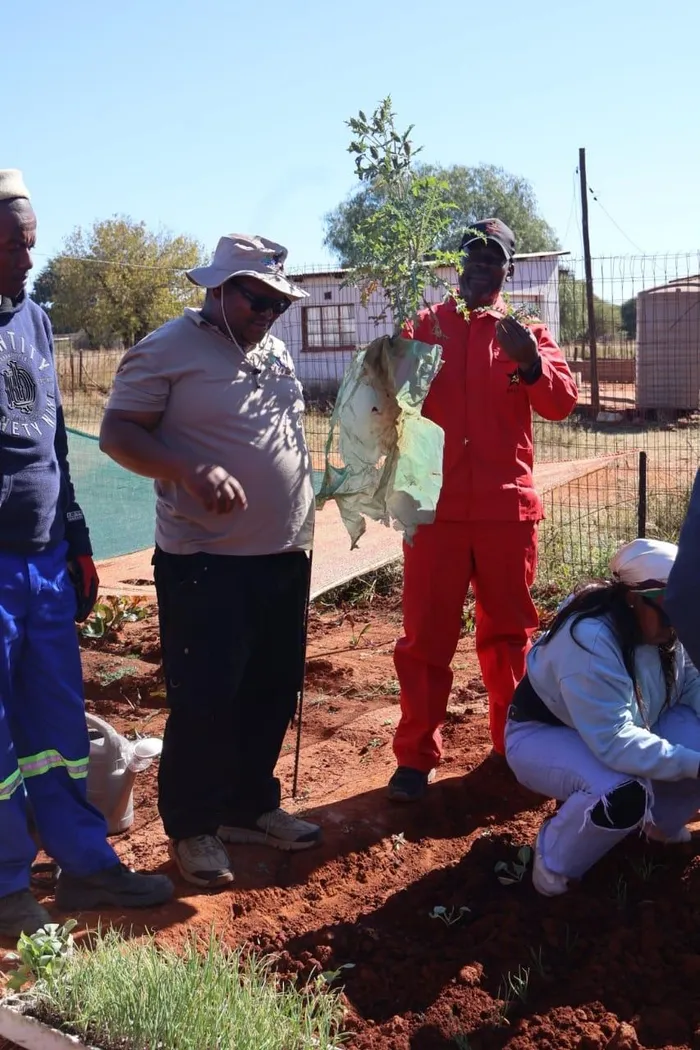The SACP's People’s Caravan: A Flirtation with the Electorate Ahead of Local Government Polls?

SA Communist Party Secretary-General Solly Mapaila (2nd from left) at the launch of the People's Caravan initiative held at Motlhabe Village, North West Province on June 2, 2025. The question is not whether the Party can win votes, but whether it can become real, in the Marxist-Leninist sense, as a Party rooted in mass life, capable of organising, defending, and advancing the concrete interests of the working class and the poor, says the writer.
Image: SACP/X
Zamikhaya Maseti
The South African Communist Party (SACP) has launched the People’s Caravan Campaign. For the first time in recent memory, its Red Flag does not merely flutter in alliance corridors but plants itself in the dust of working-class existence. Over the weekend, I gave myself the time and the ideological quiet to study the concept document titled The People's Caravan: Going Back to the Grassroots.
My cursory reading of the document revealed a theoretical looseness that undermined its ideological force. It would have stood on firmer ground, tighter, and more convincing had it been anchored in the historical documents of the African National Congress (ANC) and the South African Communist Party (SACP). No text emerges in isolation; every articulation is part of a longer dialectical lineage.
It is precisely within this context that I juxtaposed the document, deliberately and methodically, against three seminal coordinates within the Marxist-Leninist tradition texts that have not only illuminated but actively structured the ideological scaffolding of our national liberation struggle. I want to mention these three coordinates in the following order: the ANC Strategy and Tactics Document (1969), the ANC Green Book (1979), and the SACP’s Path to Power (1989).
Let me begin with what must be affirmed: the People’s Caravan Campaign has jolted the SACP from a deep slumber. It is visible now, not in press briefings, but in places where the class war lives, communities battered by municipal neglect and economic dispossession.
One only wishes this campaign were not a seasonal flirtation with the masses in the run-up to the 2026 National Local Government Elections, only to retreat into ideological slumber once the ballots are counted. This mode of engagement must not be episodic. It must be genetically encoded into the Party’s operational DNA.
The concept document itself makes several compelling claims. It presents the People’s Caravan Campaign as a revolutionary, mass-based programme intended to reconnect with the people and reconstitute grassroots power, that elemental force needed to advance the socialist struggle of the workers and the poor.
It acknowledges, quite correctly, that electoral contests are only one terrain of class struggle. It also gestures at global Left mobilisation. Yet even in that gesture, the document renders Africa absent a Continental silence that is politically untenable. Yes, the 5th Special National Congress did refer to African developments, but only in passing. This is not a luxury; it is a necessity. Africa’s contemporary currents are not peripheral; they are tectonic.
Consider this: Namibia is now led by women at the highest echelons, a female President, Dr Netumbo Nandi-Ndaitwa, and Deputy President, Lucia Witbooi. Botswana’s political scene is rejuvenated by a young President, Duma Boko. In Senegal, it is President Bassirou Diomaye Faye, and in Burkina Faso, Captain Ibrahim Traoré stands as a revolutionary mirror to Thomas Sankara, drawing mass support and articulating a new strain of post-colonial defiance. In Mali, the military junta holds the reins of state.
Both countries, Mali and Burkina Faso are aligned with Russia, a power whose strategic relationship to African sovereignty must be rigorously analysed. What is the SACP’s stance? How does a Marxist-Leninist Party position itself on these emergent formations? Does it embrace or disavow the militarised popular governments emerging across Francophone Africa?
And how does it read the Russian presence, as imperial residue or as dialectical opportunity? These questions are not rhetorical. They are strategic. They belong inside the People’s Caravan Campaign theoretical engine.
Even in its global analysis, the document introduces strange contradictions. It suggests building alliances with COSATU, civic movements, and even faith-based organisations. Let us pause here: a Marxist-Leninist Party partnering with theological institutions? That is a line that demands ideological double-clicking. We will return to it.
Still more puzzling is the near-total absence of the African National Congress (ANC) in the strategic partnership framework. That silence is not accidental. It is either an editorial lapse or a soft signal of rupture. Either way, it must be named.
A second issue worthy of double-clicking. Equally ambiguous is the role of COSATU. As the Party moves toward contesting the 2026 National and Local Government Elections, what is COSATU’s position? Is it aligned? Is it hesitant? And why does the Party treat COSATU as if it were the only labour federation in the country?
This is factional myopia at best, and strategic suicide at worst. The SACP, if it is serious about its vanguard role, must begin to agitate for a unified working-class front, cutting across NACTU, FEDUSA, and SAFTU. One federation. One country.
If the Party is to usher in the Second Stage of the National Democratic Revolution (NDR), that transitional detour toward socialism, we cannot do so with a fragmented and politically anaemic working class. And if the Party is to contest elections, such a resolution must be anchored in foundational texts: the ANC’s Green Book and The Path to Power. But the resolution adopted in 2024 appears unmoored from that historical logic. This disconnect is the third matter I will interrogate in greater detail.

SACP activists led by Secretary-General Solly Mapaila constructing a vegetable garden as part of the People's Caravan campaign in Motlhabe Village, North West Province on June 2, 2025.
Image: SACP/X
The People’s Caravan Programme does not move in abstraction. It travels along the neglected veins of the Republic: informal settlements, townships, rural outposts, locations evacuated by policy but saturated with pain. It is here where the Party now seeks to inscribe itself, not with empty slogans, but with presence. The politics of the People’s Caravan Campaign is one of pedestrian intimacy: house visits, open-air street engagements, and listening posts that attempt to restore a culture of direct political encounters.
This is a necessary departure from the Party's historical reliance on alliance theatre, where strategic importance was confused with symbolic positioning. Through the People’s Caravan Campaign, the SACP is not theorising about community relevance from the lofty heights of national structures; it is testing its viability in the mud of lived experience.
The question is not whether the Party can win votes, but whether it can become real, in the Marxist-Leninist sense, as a Party rooted in mass life, capable of organising, defending, and advancing the concrete interests of the working class and the poor.
The Party's resolution to contest the 2026 election is not informed or anchored in any of the above documents. The ANC Green Book is very clear on the Two-Stage Theory of the Revolution. Pallo Jordan explains it very succinctly in his presentation to the Politico-Military Strategy Commission of the ANC in Lusaka.
He said: "We debated the more long-term aims of our National Democratic Revolution (NDR) and the extent to which the ANC, as a national movement, should tie itself to the ideology of Marxism-Leninism and publicly commit to the Socialist option." He elaborated further and stated that the ANC is not the Party. However, the support of the Socialist Order is a matter of tactical consideration.
It therefore follows that the ANC acknowledges the role of the Party as the vanguard of the working class. It is therefore the SACP that must usher the South African people into the Second Stage of the National Democratic Revolution (NDR) as a political vanguard of the working class. The fundamental strategic and tactical questions that the SACP must answer are:
- Has the ANC changed its attitude towards the establishment of the socialist order?
- On what theoretical and ideological basis was the resolution to contest the 2026 National Government Elections taken?
- Is the SACP convinced that the First Stage of the National Democratic Revolution has been completed, as the ANC Green Book clearly outlines which vanguard at one stage and which on the second?
- How does the SACP foresee the nature and form of the Tripartite Alliance after it has contributed to the ANC’s electoral downward swing, which is predicted to be at 32% nationally?
The SACP must still make a convincing theoretical argument as it goes ahead with the implementation and rolling out of the People’s Caravan Campaign.
As I conclude, my considered view is that the outcome of the May 2024 National General Elections represents a regression and therefore, the First Stage of the National Democratic Revolution (NDR) is incomplete, and the ANC is at its weakest.
* Zamikhaya Maseti is a Political Economy Analyst with a Magister Philosophiae (M. PHIL) in South African Politics and Political Economy from the University of Port Elizabeth (UPE), now known as the Nelson Mandela University (NMU).
** The views expressed do not necessarily reflect the views of IOL, Independent Media or The African.